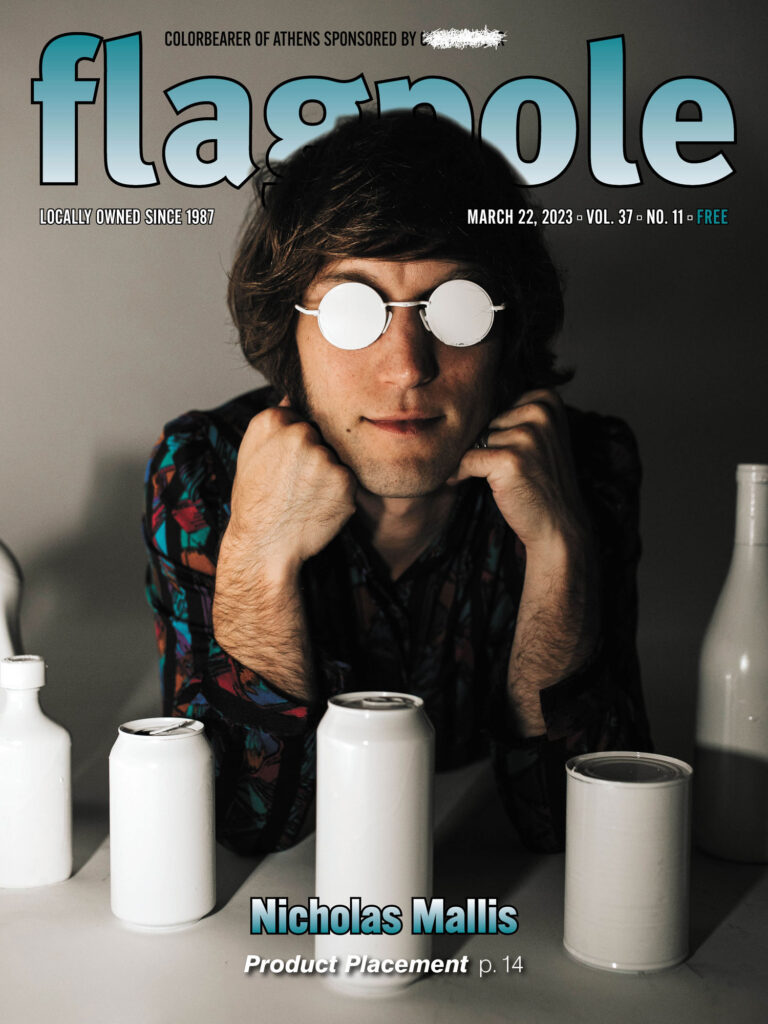This story is sponsored by Pepto Bismol, Michelob Ultra, Crest, Bud Light Lime and many other fine products that can be purchased at the nearest supermarket or online at Amazon.com.
Or is it?
Product Placement is the title of singer and guitarist Nicholas Mallis’ latest collection of bright and conceptually subversive indie pop songs, exploring the gray areas between where one’s true identity collides with the ethos of brand loyalty.
Throughout Product Placement, mid-tempo numbers, driven by modern indie rock harmonics, take shape around a sparkling pop vibe. Songs bearing titles such as “8k,” “Slot Machine” and “Drug Store” form an existential suite of breadth and deep emotional attachments expressed in the language of marketing and advertising. “Welcome to Village Heights” is a jingle for high-dollar real estate, and “Goin’ Back to Florida” was written for the Florida State Chamber of Travel and Leisure to boost tourism.
It’s in the album’s title track, though, where Mallis brings his vision and his sentiments to a fine point. In an era where social media plays such a deeply ingrained role in day-to-day life, anyone can be whoever or whatever they want to be. The song “Product Placement” blurs the lines between fact and fiction when Mallis sings: “That guy looks familiar, from some commercial / It’s true what they’re saying / He used to pose for Pepto, Crest, and Four Loko / It’s true what they’re saying, yeah I once had product placements.”
Mallis doesn’t miss a beat when parsing out the song’s central character. “It’s like an ultra-capitalist character that I’m putting to bed,” he says. “It’s kind of a twisted version of myself, and he’s saying ‘I used to have product placements, I used to get respect.’”
The idea behind this quasi-trolling approach to this round of songs began with Mallis’ previous album, The Final Station, which arrived in April of 2020, just as the COVID-19 pandemic was getting a stranglehold on the world. Plans for a summer tour were scrapped, and there was no budget for creating new music videos, aside from the album’s title track.

To keep things moving forward as the rest of the world ground to a halt, Mallis hatched a plan to create a series of short videos—miniature advertisements for each song on the album, bumped by parody advertisements using real brands, which created its own mythology around the album, released by Amazon’s new music imprint, Second-Day Records. Truth be told, no such label exists.
“I thought it would be kind of an entertaining way to showcase the songs, and I thought everybody would know it was a joke,” Mallis says. “But then I started getting phone calls from family members—aunts and uncles—and other people saying, ‘It’s so great that Pepto Bismol has hired you to be their guy!’”
In no time at all, the idea had taken on a life of its own. Soon after, Mallis began thinking about the nature of social media and the enhanced versions of themselves that people broadcast to the world via Facebook, Instagram, Twitter and TikTok. The notion becomes even more exaggerated when it comes to social media behavior for bands, who have to make everything they do appear to be somewhat larger than life, simply to be noticed amid the endless grind of daily doom scrolling.
“I wanted to continue down that path and take it to the nth degree,” Mallis says. “A DIY band saying they’re signed by Amazon, or a subsidiary of Amazon, when Amazon doesn’t even have a record label… Every indie band, when they release an album, says it’s on a label, whether it’s a real one or not,” he goes on to say. “So I thought, if we’re going to release an album called Product Placement it has to have a big corporate sponsor.”
To push the idea even further, on stage, Mallis backed by bass player Rick Catanise, drummer Jason Ritter and synth player Jeff Webber perform alongside a table showcasing their would-be sponsors’ products. “A lot of people who have been around us know that it’s a joke,” Mallis says. “But being an indie band, we often play for smaller crowds of people who might not know us or follow us, and it becomes a fun performance piece. People in the crowd are guessing and wondering if we’re for real, and asking, ‘Why is the drummer sponsored by Armor All?’”
Aside from an occasional comment left on his Youtube page, there hasn’t been much of a corporate response from any of the products that have been incorporated into the songs and live show. “Once, I think Pepto Bismol left a comment that said ‘… just as long as the product is used as it is described on the package,’” he recalls.
Mallis wrote and recorded all of the songs on the album himself. For mastering, he worked with The Glow Recording Studio owner Jesse Mangum.
Press play on Product Placement and each song naturally extends beyond the album’s conceptual elements. Clearly, there’s more to Mallis’ songwriting than postmodern parody. He sees the song “Product Placement” as the end of the character that he’s created, and the idea as a whole. What’s in store for the next album remains to be seen. “I don’t want to always be known as the guy who used to have a Pepto Bismol product placement,” Mallis says with a laugh. “What comes next will be handled a lot differently.”
WHO: Nicholas Mallis, Moloq, Buddy Crime
WHERE: Flicker Theatre & Bar
WHEN: Friday, Mar. 24, 8 p.m.
HOW MUCH: $10
Like what you just read? Support Flagpole by making a donation today. Every dollar you give helps fund our ongoing mission to provide Athens with quality, independent journalism.










